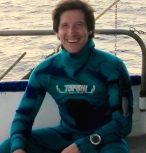DNA reveals the past and future of coral reefs
New DNA techniques are being used to understand how coral reacted to the end of the last ice age in order to better predict how they will cope with current changes to the climate. James Cook Univer

From 2005 to 2022, the main node of the ARC Centre of Excellence for Coral Reef Studies was headquartered at James Cook University in Townsville, Queensland (Australia)








Abstract: Stakeholder compliance is a vital component of successful fisheries management. However, non-compliance is often the rule rather than the exception, and many fisheries management authorities simply note that detailed compliance information or monitoring programs are beyond their current scope. Marine reserves are increasingly popular fisheries management and conservation tools, but the majority of the world’s reserves are not managed to effectively enforce compliance. Thus, effective marine reserves are contingent upon a proper understanding of the compliance problems, including representative measurements of non-compliance, and understanding of the drivers of compliance decisions. Thus, the aim of this project is to examine the methods used to measure compliance, and explore the drivers of recreational fishers’ compliance decisions. Specifically, this project will validate novel compliance measurement methods, cross-validate different methods for eliciting sensitive information on poaching, and examine how normative influences (i.e. social and personal norms) and institutional design principles affect individual’s compliance decisions. Research outputs of this project will be of direct relevance to fisheries management and the field of conservation biology.
Biography:
Brock grew up in rural Minnesota baling hay, wrangling horses, and trapping the odd backcountry beaver. He quickly developed a love of the outdoors and the natural world while quietly observing the role that humans play as environmental stewards. During his travels through India, Southeast Asia and the South Pacific, he witnessed a seemingly widespread lack of environmental knowledge and stewardship that resulted in the degradation of the regions’ natural resources, including the coral reefs. After several sunset reflection sessions, Brock decided to continue racking up his student debt and complete a masters degree in marine biology at JCU. During his time at JCU, Brock has begun exploring how fishers and other resource users interact with the marine environment and the management systems that are in place to preserve it. He is currently a PhD candidate in the ARC Centre of Excellence for Coral Reef Studies under the supervision of Prof. Josh Cinner, Prof. Terry Hughes, Prof. Garry Russ, Dr. Stephen Sutton and Dr. David Williamson. His PhD will explore the social and ecological dynamics of stakeholder compliance to fisheries management regulations, with an emphasis on no-take marine reserves.
New DNA techniques are being used to understand how coral reacted to the end of the last ice age in order to better predict how they will cope with current changes to the climate. James Cook Univer
A new study on the effects of climate change in five tropical countries has found fisheries are in more trouble than agriculture, and poor people are in the most danger. Distinguished Profess
James Cook University researchers have found brightly coloured fish are becoming increasingly rare as coral declines, with the phenomenon likely to get worse in the future. Christopher Hemingson, a
Researchers working with stakeholders in the Great Barrier Reef region have come up with ideas on how groups responsible for looking after the reef can operate more effectively when the next bleaching
Abstract: As marine species adapt to climate change, their heat tolerance will likely be under strong selection. Individual variation in heat tolerance and its heritability underpin the potential fo
Abstract: The Reef Ecology Lab in KAUST’s Red Sea Research Center explores many aspects of movement ecology of marine organisms, ranging from adult migrations to intergenerational larval dispersal
Abstract: Macroalgal meadows are a prominent, yet often maligned component of the tropical seascape. Our work at Ningaloo reef in WA demonstrate that canopy forming macroalgae provide habitat for ad
Abstract: Sharks are generally perceived as strong and fearsome animals. With fossils dating back at least 420 million years, sharks are not only majestic top predators but they also outlived dinosa
Abstract: Connectivity plays a vital role in many ecosystems through its effects on fundamental ecological and evolutionary processes. Its consequences for populations and metapopulations have been
Abstract: Evolution of many eukaryotic organisms is affected by interactions with microbes. Microbial symbioses can ultimately reflect host’s diet, habitat range, and even body shape. However, how
Abstract: The past few years have seen unprecedented coral bleaching and mortality on the Great Barrier Reef (GBR) but the consequences of this on biodiversity are not yet known. This talk will expl